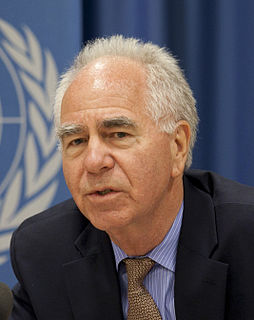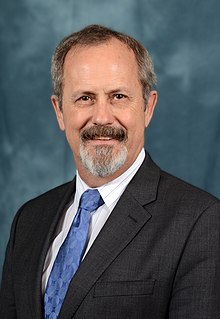Related Research Articles

A disaster is a serious problem occurring over a short or long period of time that causes widespread human, material, economic or environmental loss which exceeds the ability of the affected community or society to cope using its own resources. Disasters are routinely divided into either "natural disasters" caused by natural hazards or "human-instigated disasters" caused from anthropogenic hazards. However in modern times, the divide between natural, man-made and man-accelerated disasters is quite difficult to draw.

Epidemiology is the study and analysis of the distribution, patterns and determinants of health and disease conditions in defined population.

Environmental health is the branch of public health concerned with all aspects of the natural and built environment affecting human health. In order to effectively control factors that may affect health, the requirements that must be met in order to create a healthy environment must be determined. Environmental health focuses on the natural and built environments for the benefit of human health. The major sub-disciplines of environmental health are environmental science, toxicology, environmental epidemiology, and environmental and occupational medicine.

Humanitarian aid is material and logistic assistance to people who need help. It is usually short-term help until the long-term help by the government and other institutions replaces it. Among the people in need are the homeless, refugees, and victims of natural disasters, wars, and famines. Humanitarian relief efforts are provided for humanitarian purposes and include natural disasters and man-made disasters. The primary objective of humanitarian aid is to save lives, alleviate suffering, and maintain human dignity. It may, therefore, be distinguished from development aid, which seeks to address the underlying socioeconomic factors which may have led to a crisis or emergency. There is a debate on linking humanitarian aid and development efforts, which was reinforced by the World Humanitarian Summit in 2016. However, the conflation is viewed critically by practitioners.

A humanitarian crisis is defined as a singular event or a series of events that are threatening in terms of health, safety or well-being of a community or large group of people. It may be an internal or external conflict and usually occurs throughout a large land area. Local, national and international responses are necessary in such events.

Disaster response is the second phase of the disaster management cycle. It consists of a number of elements, for example; warning/evacuation, search and rescue, providing immediate assistance, assessing damage, continuing assistance and the immediate restoration or construction of infrastructure. The aim of emergency response is to provide immediate assistance to maintain life, improve health and support the morale of the affected population. Such assistance may range from providing specific but limited aid, such as assisting refugees with transport, temporary shelter, and food to establishing semi-permanent settlements in camps and other locations. It also may involve initial repairs to damaged or diversion to infrastructure.
The Earth Institute is a research institute at Columbia University that was established in 1995. Its stated mission is to address complex issues facing the planet and its inhabitants, with a focus on sustainable development. With an interdisciplinary approach, this includes research in climate change, geology, global health, economics, management, agriculture, ecosystems, urbanization, energy, hazards, and water. The Earth Institute's activities are guided by the idea that science and technological tools that already exist could be applied to greatly improve conditions for the world's poor, while preserving the natural systems that support life on Earth.
The Sudanese Red Crescent (SRC) is the biggest and most decentralized and widespread humanitarian organization operating in Sudan. The society developed out of the Sudan branch of the British Red Cross Society and was established in 1956. Upon Sudan's independence in March 1956 received official recognition as an independent National Society following the Sudanese Council of Ministers decree No. 869. The National Society covers nearly the entire country with 15 State branches and several sub-branches/units in the provinces/localities and administrative units, with a nationwide community-based network of 35,000 active volunteers and another 300,000 who can be deployed as need arises. It has well-established working relations with public authorities at federal, state and local levels, and good partnership and collaboration with Movement partners and UN specialized agencies and national and international NGOs working in Sudan.
Opened in 1984, the University of South Florida College of Public Health, offers master's degrees in Public Health (MPH), a Master of Science in Public Health (MSPH) which is a more academic and research oriented master's degree, and a master's degree in Health Administration (MHA), along with a doctorate (PhD) in Public Health and several dual degrees in collaboration with other colleges- most notably the dual PhD/MPH program in Applied Anthropology. The MHA in Public Health Practice is an innovative program for health professionals which can be attained through weekend executive or distance learning format.

Dr. Neil Boothby is a psychologist and former US Government special advisor and senior coordinator to the USAID administrator on Children in Adversity, and former director of the Program on Forced Migration and Health at the Columbia University Mailman School of Public Health. Currently, he is the founding Director of the Global Center for the Development of the Whole Child at the University of Notre Dame. His research focuses on the psychosocial consequences of organized violence on children. As a senior representative of UNICEF, UNHCR, and Save the Children, he has worked for more than 25 years with children in crises in Africa, Asia, Latin America, and Eastern Europe and is an internationally recognized expert and advocate for children affected by war and displacement. He has received numerous awards for his work on behalf of war-affected children, including the Red Cross International Humanitarian of the Year Award, the Mickey Leland Award, the United Nation's Golden Achievement Award for Social Services, and Duke University's Humanitarian Service Award.
The Harvard Humanitarian Initiative (HHI) is an interfaculty Harvard University initiative dedicated to advancing research, practice, and policy in the field of humanitarian assistance. HHI’s mission is "to relieve human suffering in war and disaster by advancing the science and practice of humanitarian response worldwide".
Relief International is a humanitarian non-profit agency that provides emergency relief, economic rehabilitation, development assistance, and programme services to vulnerable communities worldwide. Relief International UK is non-political and non-sectarian in its mission. It is based in Washington, D.C. and in London.
The Office of U.S. Foreign Disaster Assistance (OFDA) was an organizational unit within the United States Agency for International Development (USAID) charged by the President of the United States with directing and coordinating international United States government disaster assistance. USAID merged the former offices of OFDA and Food for Peace (FFP) in 2020 to form the Bureau for Humanitarian Assistance (BHA).

Humanitarianism in Africa refers to the intentions and actions of people, nations, and organizations to alleviate human suffering in Africa. Humanitarian policies have focused on improving problems in Africa such as poverty, poor-health, corruption, and ethnic/inter-state conflict. Prominent entities which engage in humanitarian action in Africa include but are not limited to: foreign nations like the United States (US), domestic nations like South Africa, international organizations like the World Bank, the International Monetary Fund (IMF), and the United Nations (UN), Non-Governmental Organizations (NGOs) like the Red Cross and Doctors Without Borders, and even personal celebrities like Bono. Prominent methods of promoting humanitarianism in Africa have been foreign aid, humanitarian intervention, and UN sanctioned peacekeeping.
Evidence Aid is an international platform that was formed out of the need to deliver time sensitive access to systematic reviews for use in the event of disasters and other humanitarian emergencies. The method of using systematic reviews is to provide evidence for use by policy makers, clinicians, regulators, and even the general public who benefit when these materials are easy to understand and are accessible. The vision of Evidence Aid is to create and satisfy an increasing demand for evidence to improve the impact of humanitarian aid by stimulating the use of an evidence-based approach. Evidence Aid was founded in 2004. It is currently a project that is housed by the Cochrane Collaboration and Queen's University Belfast. Evidence Aid was established by several members of the international Cochrane Collaboration following the 2004 Indian Ocean earthquake and tsunami. Evidence Aid was formed to provide systematic reviews on the effects of interventions and actions of relevance prior to, in the course of and during the aftermath of disasters or other humanitarian emergencies, in order to improve health-related outcomes; their aim is to work with those who need and use this evidence, as well as working with researchers and publishers to facilitate freely accessible materials to meet the information needs for those facing humanitarian emergencies and disasters. Evidence Aid works in collaboration with other organizations including Public Health England; Red Cross Flanders, International Rescue Committee; Centers for Disease Control; Centre for Evidence-Based Medicine; and the University of Oxford.
Collaborating Centre for Oxford University and CUHK for Disaster and Medical Humanitarian Response (CCOUC). was established jointly by Oxford University and The Chinese University of Hong Kong (CUHK) as a non-profit research centre to carry out research, training and community knowledge transfer in the area of disaster and medical humanitarian response in Greater China and the Asia-Pacific Region. It is housed in the CUHK Faculty of Medicine and its director is Emily Ying Yang Chan as of 2016.
Frederick M. "Skip" Burkle, Jr. is an American physician known for his work in human rights, international diplomacy and peacemaking, humanitarian assistance, and disaster response. He has been called "the single most talented and experienced post-conflict health specialist working for the United States government." His medical qualifications include pediatrics, emergency medicine, psychiatry, public health, and tropical medicine.

Emergency sanitation is the management and technical processes required to provide sanitation in emergency situations. Emergency sanitation is required during humanitarian relief operations for refugees, people affected by natural disasters and internally displaced persons. There are three phases of emergency response: Immediate, short term and long term. In the immediate phase, the focus is on managing open defecation, and toilet technologies might include very basic latrines, pit latrines, bucket toilets, container-based toilets, chemical toilets. The short term phase might also involve technologies such as urine-diverting dry toilets, septic tanks, decentralized wastewater systems. Providing handwashing facilities and management of fecal sludge are also part of emergency sanitation.
Debarati Guha-Sapir is an Indian epidemiologist and public health researcher based in Belgium. She is the director of the Université catholique de Louvain Centre for Research on the Epidemiology of Disasters.

Thomas Dean Kirsch is an American physician, scientist, and writer whose career has focused on disaster preparedness and response. He has been described as “…an expert in disaster research, planning and response, and disaster and wilderness medicine… both nationally and internationally”.
References
- ↑ "Site de l'UCLouvain à Bruxelles". Archived from the original on 2006-10-08. Retrieved 2008-05-23.
- ↑ APHES - Assessing Public Health in Emergency Situations